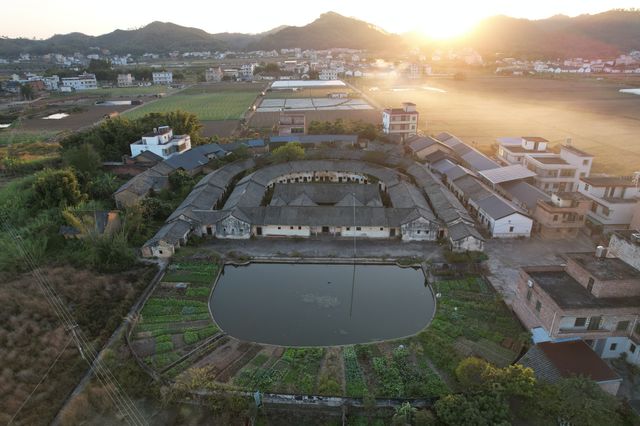The Dafudi Residence in Huxi Village, Xingning, Guangdong
VictoriaMcDermott99
Li Heming House in Fuling Village, Xingning, Guangdong
VictoriaMcDermott99
Xingning, Guangdong's Ganzicun Wuzhenwei
VictoriaMcDermott99
Jigongqiao Village, Long'an Wei, Xingning, Guangdong
VictoriaMcDermott99
Huangdou Pai Liu House is located in Hulong Village, Xingning, Guangdong
VictoriaMcDermott99
Tangyicun Jinshi Mansion in Xingning, Guangdong
VictoriaMcDermott99
Xinlin Old House in Xinbei Village, Xingning, Guangdong
VictoriaMcDermott99
Huangji Village in Xingning, Guangdong, is known for its Tongshu Luo houses
VictoriaMcDermott99
Xingning's Zhouxing Village in Guangdong is home to the Di Hua Wei enclosure
VictoriaMcDermott99
Yunhua House in Malingshan Village, Xingning, Guangdong
VictoriaMcDermott99
Popular Trip Moments
The Dafudi Residence in Huxi Village, Xingning, Guangdong | Li Heming House in Fuling Village, Xingning, Guangdong | Xingning, Guangdong's Ganzicun Wuzhenwei | Jigongqiao Village, Long'an Wei, Xingning, Guangdong | Huangdou Pai Liu House is located in Hulong Village, Xingning, Guangdong | Tangyicun Jinshi Mansion in Xingning, Guangdong | You must visit Xingning and experience the sun at Shenguang Mountain | Xinlin Old House in Xinbei Village, Xingning, Guangdong | Zhengjiang Village in Xingning, Guangdong, is home to the Le Shan Wei compound | The Malu Xia Dawang House is located in the Xijiao community of Xingning, Guangdong | Huangji Village in Xingning, Guangdong, is known for its Tongshu Luo houses | Xingning's Zhouxing Village in Guangdong is home to the Di Hua Wei enclosure | Yunhua House in Malingshan Village, Xingning, Guangdong | Liwu Village in Mizaizhai, Xingning, Guangdong | Peng Chengchang House in Zhuyi Village, Xingning, Guangdong | A great place to hibernate in winter, so comfortable you won't want to leave! | The Shizi Mouth House in Luoba Village, Xingning, Guangdong
Popular Destinations
Fukuoka Travel | Seneca Falls Travel | Sapporo Travel | Phu Quoc Island Travel | Nice Travel | Gainesville Travel | Athens Travel | Province of Bali Travel | Pinellas County Travel | Ulaanbaatar Travel | Bay Saint Louis Travel | Bettendorf Travel | Edinburgh Travel | Biru Travel | United Kingdom Travel | Orange Beach Travel | Makati Travel | Vang Vieng Travel | Ulanqab Travel | Gaiole in Chianti Travel | Lanling Travel | Beirut Travel | Borgo San Lorenzo Travel | Quemchi Travel | Woodbridge Travel | Surrey Travel | Ashton-under-Lyne Travel | Montville Travel | Grand Chute Travel
Recommended Attractions at Popular Destinations
Bangkok attraction near me | Tokyo attraction near me | Manila attraction near me | Hong Kong attraction near me | Taipei attraction near me | Seoul attraction near me | Los Angeles attraction near me | New York attraction near me | Shanghai attraction near me | Kuala Lumpur attraction near me | Shenzhen attraction near me | Osaka attraction near me | Singapore attraction near me | Guangzhou attraction near me | London attraction near me | San Francisco attraction near me | Beijing attraction near me | Macau attraction near me | Bali attraction near me | Paris attraction near me | Ho Chi Minh City attraction near me | Orlando attraction near me | Jakarta attraction near me | Chicago attraction near me | Phuket attraction near me | Toronto attraction near me | Istanbul attraction near me | Dallas attraction near me | Cebu attraction near me | Seattle attraction near me
Popular Attractions
The Grand Palace | Yves Saint Laurent Mansion | Yokohama Hakkeijima Sea Paradise | Miniatur Wunderland | Ocean Park Hong Kong | Universal Beijing Resort | Kuala Lumpur Tower | Carnival Magic Phuket | American Museum of Natural History | Tokyo Skytree | Phuket Aquarium | Paris Zoological Park | Yangtze River Cableway | Harmonyland | SUMMIT One Vanderbilt | Oriental Pearl Radio & Television Tower | Manila Ocean Park | New Jersey SEA LIFE Aquarium | Universal Studios Singapore | The Sanctuary of Truth | Schönbrunn Palace | Universal Studios Florida | Skydeck Chicago | Burj Khalifa | Mirror Maze | California Academy of Sciences | Monterey Bay Aquarium | Parque Warner Madrid | Deutsches Museum | Zoobic Safari
Popular Restaurants in Xingning
曾记猪肉汤(南门坛路总店) | 叶南渔村 | Hualaishi (xingningxingfu) | FENG LIN WAN NIU BA ZI ZHU XI CAN TING | Liankangwei'ersiguoji Restaurant | 梅梅饭店 | 兴宁市锦都食府 | CHENG NA HAI XIAN YU GANG | KFC (xingtianyilu) | 新景居酒家 | 耐思阳光原叶(兴宁店) | SHANG HAO CHA CAN TING | 兴宁玖崇湖凤颐温泉酒店·凤凰轩中餐厅 | NA TAI FAN DIAN | 老北京 | 曾记(广场店) | LIN XIAO XIAN JIAN KANG TIAN PIN XING DONG LU DIAN | McDonald's (xingningdi'er) | 金誉蛋糕(曙光店) | 江湖鱼道(兴田一路店) | 客乡然(泰宁花园店) | 奇鱼夫烤鱼 | 集福酒楼(神光山旅游景区店) | 牛记 | 抖鱼(兴宁店) | JIA KE LAI NIU PAI ZHUAN GU ZI ZHU CAN | XING NING SHI SHUI KOU ZHEN JI XIANG JIU GU | 麦当劳(兴宁店) | 攒爷河鲜(兴宁·毅德城2号交易广场店) | 宏兴美食
Popular Ranked Lists
Popular Nightlife Districts in Pattaya | Popular Luxury Hotels Near Meyrueis | Popular Luxury Hotels in Sapporo | Popular Premium Hotels in Choc | Popular Premium Hotels in Pokolbin | Top 12 Clubs in Athens | Popular Family-friendly Attractions Near Luxi | Popular Family-friendly Attractions Near Genhe | Popular Premium Hotels in Anning | Top 6 Premium Hotels in Siracusa | Popular Luxury Hotels Near Merida | Popular Nightlife Districts in Lijiang | Popular Nightlife Districts in London | Popular Luxury Hotels in Milas | Popular Premium Hotels in Kucukkoy Belediyesi | Popular Luxury Hotels Near Bandol | Popular Luxury Hotels Near Sonepat | Popular Luxury Hotels Near Bucharest | Popular Luxury Hotels in Victoria Falls | Popular Fine Dining in Paris | Popular Nightlife Districts in Pattaya | Popular Nightlife Districts in Dublin | Popular Nightlife Districts in Taipei | Popular Nightlife Districts in Jinghong | Popular Nightlife Districts in Las Vegas | Popular Nightlife Districts in Shanghai | Popular Nightlife Districts in London | Popular Nightlife Districts in Seoul | Popular Nightlife Districts in Beijing | Popular Nightlife Districts in Chengdu
About
Payment Methods
Our Partners
Copyright © 2024 Trip.com Travel Singapore Pte. Ltd. All rights reserved
Site Operator: Trip.com Travel Singapore Pte. Ltd.
Site Operator: Trip.com Travel Singapore Pte. Ltd.








































